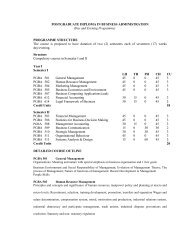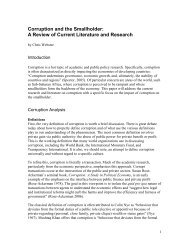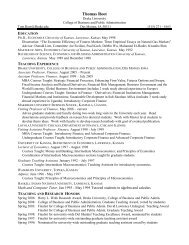13th Annual International Management Conference Proceeding
13th Annual International Management Conference Proceeding
13th Annual International Management Conference Proceeding
You also want an ePaper? Increase the reach of your titles
YUMPU automatically turns print PDFs into web optimized ePapers that Google loves.
There are similarly many questions about what the psychological and social traits of entrepreneurs are. The<br />
same traits shared by two individuals can often lead to vast different results; successful and unsuccessful<br />
entrepreneurs can share the characteristics commonly identified. As well, the studies of the life paths of<br />
entrepreneurs often show decreasing 'entrepreneurship' following success, which tends to disprove the<br />
centrality of character or personality traits as a sufficient basis for defining entrepreneurship Bird (1989).<br />
Kigundu (2002) sums up that both negative and positive correlates may lead to entrepreneurial success. See<br />
the correlates listed in Table 2:<br />
Table 2 Negative and Positive Correlates That Lead to Entrepreneurial Success<br />
Positive correlates Negative correlates which could sometimes be positive<br />
depending on other factors<br />
a) Achievement orientation<br />
a) Systemic corruption<br />
b) Risk taking propensity<br />
b) Community leadership<br />
c) Hard work and high energy<br />
c) Industry/sector<br />
d) Technical and managerial skills<br />
d) Sources of capital<br />
e) Business acumen<br />
e) Octopus<br />
f) Innovativeness<br />
f) Training<br />
g) Necessary infrastructure<br />
g) Consultancy<br />
h) Corporate governance<br />
h) Subsidies<br />
i) Competitiveness<br />
i) Social capital<br />
j) Political representation<br />
Source: Kigundu (2002)<br />
The focus of study in the field of entrepreneurship has shifted over the years. Increasingly there has been more focus<br />
on examining entrepreneurship from an organisational perspective. Corporate entrepreneurship, corporate venturing<br />
and intrapreneurship are all terms that are used to classify entrepreneurial activities within organisations. Viewing<br />
entrepreneurship from an organisational perspective is consistent with the views of Schumpeter (1942), who argues<br />
that entrepreneurship will eventually be dominated by firms that are capable of devoting more resources to innovation.<br />
Schumpeter (1942) presents some interesting reasoning for why a firm should increase its entrepreneurial activity. He<br />
points out that a single entrepreneur creates new profitable avenues. As a result, he indicates that more entrepreneurs<br />
innovating are good for the economy as a whole. Applying these ideas to the firm level, the more sources of<br />
entrepreneurial activity within the firm, the more the opportunity is created for the firm. Schumpeter (1942) also<br />
proposes that entrepreneurial-driven economic activity leads to higher levels of income and that this relationship does<br />
not suffer from diminishing returns.<br />
This paper adopts the definition by Hirsh and Peters (2002), that entrepreneurship is the process of creating<br />
something new with value by devoting the necessary time and effort, assuming the accompanying financial, psychic,<br />
and social risks, and receiving the resultant rewards of monetary and personal satisfaction and independence. Further,<br />
Bird’s (1989) definition of entrepreneurial behaviour will be adopted: “entrepreneurial behaviour is opportunistic,<br />
value-driven, risk accepting, creative activity where ideas take the form of organisational birth, growth or<br />
transformation” (pg 5).<br />
2.2 The Concept of Intrapreneurship<br />
The word ‘intrapreneur’ or ‘intrapreneurship' has evolved over the last decade or so into ‘business English’. It<br />
is coined from the word ‘entrepreneur’ and represents the practice of the intrapreneur. The American<br />
Heritage Dictionary (2000) defines the intrapreneur as a person within a large corporation who takes direct<br />
responsibility for turning an idea into a profitable finished product through assertive risk-taking and<br />
innovation. The intrapreneur is the one who comes up with new ideas, who pushes for change, who develops<br />
creative responses in the organisation, who takes full advantage of opportunities. S/he should have moved<br />
from an 'administrative mode’ to an ‘entrepreneurial mode’.<br />
45
















